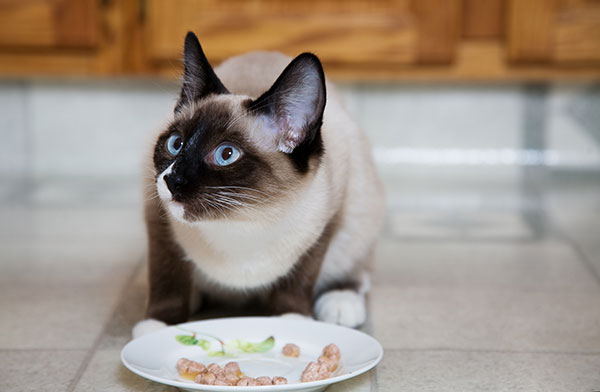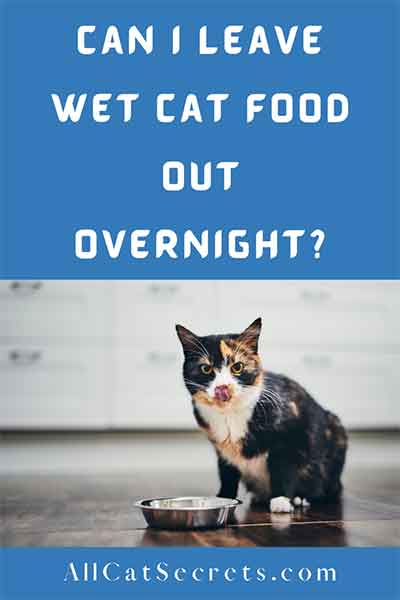When it comes to cat food, there are two main types to consider – dry and wet food. Each option has its benefits and drawbacks.
For instance, dry cat foods are noted for their ease and convenience of use. These foods are remarkably easy to serve, which makes them the go-to option for cat owners traveling with their feline friends. Plus, dry cat foods are relatively more affordable and durable.
Wet cat foods, on the other hand, are mainly preferred as they’re easier to digest. They also promote hydration while allowing cat owners to add more variety to their cat’s diets.
But if you’ve owned a cat long enough, you must have realized that the animal hardly ever finishes his food in one sitting. He will often take a few bites and then come back to the meal later. As a result, you’ll occasionally find yourself leaving wet cat food out for a considerable duration. But how safe is this practice? Is it ok to leave wet cat food out overnight?
The answer is a resounding no. Expert pet nutritionists strongly advice against leaving wet cat food out for an extended duration. That’s for the simple reason that the food will go bad, and cats shouldn’t eat rancid foods.
In this article, we unpack everything there is to know about leaving wet cat food outside. Some of the areas we shall cover include the factors that make wet cat food go bad, the risks involved, and how best to store cat food leftovers.
Table of Contents
Why Is This Information Important?
Every loving and responsible pet parent should understand the health and dietary implications of leaving cat food out overnight. That’s especially true for wet cat food.
But even before we delve deeper into the potential risks associated with leaving wet cat food out, it’s important to begin by understanding how cats eat their food.
As we’ve already indicated, cats rarely finish their food in one sitting.
The most likely reason behind this feeding habit is that cat owners generally give their feline friends more food than they can consume at once. Obviously, your cat will stop eating as soon as he’s had his fill.
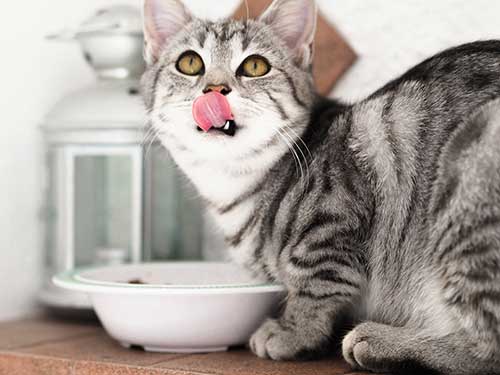
However, the behavior could also result from the fact that cats have a rather inconsistent eating habit. Cats are probably the pickiest eaters of all household pets. They may seem to enjoy their foods on some days and express total aversions to the same foods on other days.
Various medical conditions might also prevent your cat from finishing his meal. That’s especially true for diseases that result in a loss of appetite, such as pancreatitis and intestinal issues.
Another core aspect of cats’ dietary behaviors relates to their sleep-wake cycle.
Unlike humans who are generally diurnal (active during the day), cats are crepuscular. Crepuscular animals are more active at dawn and dusk.
Now, dusk also happens to be the time when we usually prepare for bedtime. And your feline companion knows this all too well. When you serve him a meal late in the evening, the animal may purposely avoid finishing his food so he can snack on it throughout the night while you’re asleep. That’s the cat’s polite way of avoiding a situation where he would have to wake you from sleep so you can feed him.
Now that cats may feed throughout the night, you could be wondering, can I leave wet cat food out all day?
The answer remains no. You shouldn’t leave wet cat food out all day or even overnight. As a matter of fact, you wouldn’t comfortably eat wet food that has been lying uncovered and unrefrigerated for ours. So, what makes it different for your cat?
- High protein cat food dry formula with real chicken as the first ingredient
- Natural with prebiotic fiber nourishes specific intestinal bacteria for digestive health
- Wholesome cat food dry kibble with vitamin A and Omega-6 fatty acids to nourish skin and coat
Last update on 2024-07-10 / Affiliate links / Images from Amazon Product Advertising API
How Long Can Wet Cat Food Sit Out Before It Goes Bad?
We’ve already pointed out that experts discourage leaving wet cat food out overnight. But overnight is such a lengthy period that it may not accurately put the issue of leaving cat food outside into a better perspective.
So, perhaps the more pertinent question to settle is, how long can I leave wet cat food out?
Wet cat food will generally start to go bad around 1 – 4 hours. The longer the duration, the more rancid the food will get.
However, note that this timeline isn’t cast in stone. Some wet cat foods may go bad much sooner while others can remain fresh for longer.
It all depends on the condition of the room in relation to bacterial activity. For instance, bacteria and other disease-causing microorganisms tend to be more active in warmer than colder environments. The implication here is that wet cat food will go bad faster in a warmer room than in a colder one.
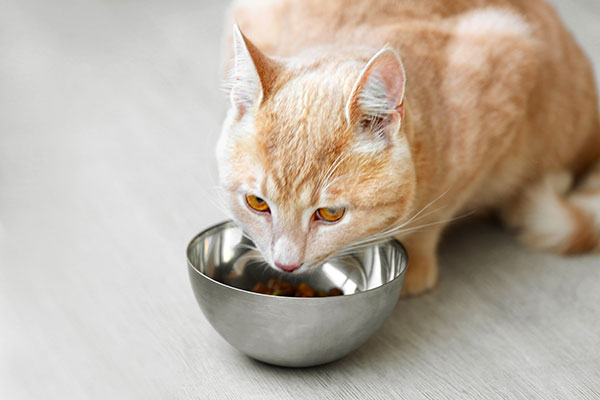
The following environmental factors play a fundamental role in determining the rate at which wet cat food may become rancid;
1. Air
Air contains thousands of germs and bacteria that might contaminate wet cat food. So, the mere exposure of cat food to air (be it wet or dry) is sometimes all that it takes to make the food go bad.
2. Temperature
Warmer temperature conditions (about 80 to 100 degrees Fahrenheit) accelerate food decay than colder temperatures.
3. Humidity
Humid conditions also provide an ideal environment for harmful bacteria and germs to thrive. The fact that wet cat food is already moisture-rich makes it even more susceptible to decay.
4. Wind
Wind promotes aeration. The higher the volume of air blowing over wet cat food, the longer the food may stay fresh. That’s because a consistent airflow helps to dispel warm, humid air, the very one known to promote bacterial growth.
5. Other Considerations
a. Surface area
The larger the surface area of wet cat food in contact with the food bowl, the sooner the food will go bad. A large surface area increases the number of bacteria that can grow in the food.
b. Food handling
Did your cat actually touch his food (whether with his mouth or paws)? Or has any other household member handled the food with their bare hands?
Note that our hands harbor numerous bacteria. And so do a cat’s mouth and paws.
So, food that has already been touched will definitely go gad sooner.
c. General hygiene conditions
Wet cat food served in a dirty bowl will obviously go bad sooner than that served in a clean bowl.
Besides, poor sanitation could attract houseflies. Remember, flies are the most notorious food contaminants of all insects.
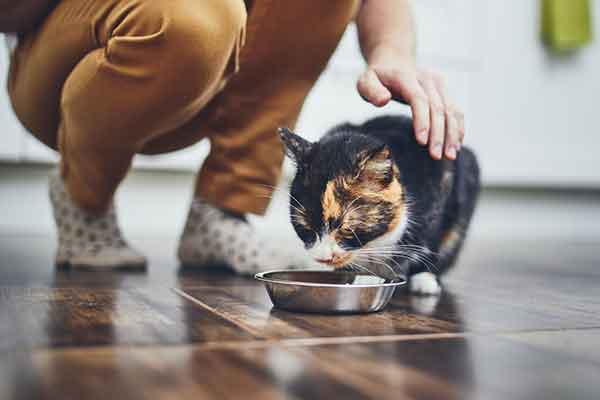
So, how long can I leave canned cat food out?
Most cat foods will go bad within 1 – 4 hours. But as we’ve seen, there’s a host of factors at play.
However, does this apply to canned foods?
Unopened canned foods will generally go bad on or around the product’s expiration date. But as soon as you open the food, the rule for storing any regular wet cat food applies.
Why Do Experts Discourage Leaving Wet Cat Food Out?
The biggest problem with leaving wet cat food out much longer is that the food will go bad.
Note that the air is full of pathogens, including bacteria, germs, fungi, and mold. While it may take days for fungi and mold to grow on spoiled food, it only takes a couple of hours for bacteria and germs to multiply in their thousands. The proliferation of bacteria on rotting foods could lead to dangerous contamination.
Common pathogens that your cat could be exposed to as a result of ingesting spoiled foods include;
- Salmonella – Commonly found in raw meat.
- Listeria – Common in raw vegetables, untreated water, soil, and animal feces.
- E. coli – Commonly found in a cat’s stomach.
- Campylobacter – Also found in a cat’s stomach.
- Staphylococcus aureus – Common in cat mucus glands
- Clostridium perfingens – More likely to be transmitted by dogs than cats.
- Clostridium botulinum – A rare bacterium known to cause botulism in humans and pets alike.
- Norovirus – A common virus that could also be transmitted by contaminated foods.
- Taxoplasma gondii – Another pesky parasite in spoiled foods.
- ✅ Food supplement for everyday use. Supports cell protection and strengthens your cat’s adaptive immune system with important...
- ✅ Organically bound trace elements zinc, manganese and selenium. DL-methionine for a well-balanced metabolism, taurine for...
- ✅ Supports cats of every age, older cats and kitten. Long-term or short-term treatment for skin and fur troubles like hair loss,...
Last update on 2024-07-10 / Affiliate links / Images from Amazon Product Advertising API
The saving grace is that cats are generally more resistant to these pathogens than humans. That said, you wouldn’t want to take any chances. Depending on your cat’s overall immunity, interaction with any of these microorganisms could be catastrophic.
Exposure to the pathogens in stale cat food may immediately present as symptoms of gastrointestinal distress, including nausea, vomiting, diarrhea, appetite loss, and abdominal pain.
The symptoms might degenerate to dehydration, fever and/or chills, labored breathing, elevated heart rate, and seizures, depending on the nature of contamination. Without urgent medical intervention, your cat may enter into a coma or even die.
Besides the risks of bacterial contamination, there are also dietary implications associated with leaving wet cat food outside for long.
First off, wet cat food left uncovered may lose its moisture and start to harden. The top of the food could become crusty. That might make such foods unappealing to cats even if they’re still in edible conditions.
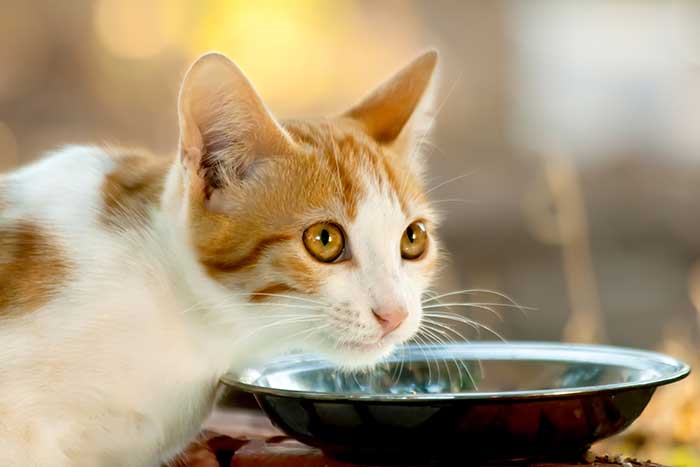
Also, one of the reasons for serving wet cat foods to your kitto is to keep the animal hydrated. This goal is unachievable if the food is left uncovered for long since it will gradually lose its moisture.
Last but not least, the oxidation and moisture loss that occurs when wet cat food is left uncovered could affect the food’s nutritional value.
How Do You Know If Wet Cat Food Is Bad?
The first indication that wet cat food has gone bad is if your cat no longer wants to eat it. If the cat has a healthy and large appetite but suddenly doesn’t want anything to do with his leftover snack, then be sure there’s something wrong with the food. Some cats might not even want to move closer to the food bowl.
You can also tell that wet cat food has gone bad if you can pick up a foul odor, usually a sour or rotten smell. Note that by the time you pick up a bad smell, the cat food usually has stayed out for much longer.
Changes in color and texture might also suggest that your cat’s wet food has gone bad. The top layer of the food may turn dark and crusty.
Mold and fungal growth are usually the last indications that cat food has stayed uncovered and unrefrigerated for a fairly long duration. By this time, the food may also begin to attract bugs.
What to Do If Your Cat Ate Spoiled Wet Food
The first thing to do if you suspect that your cat has eaten spoiled wet food is to determine the amount consumed. The larger the quantity, the more severe the side effects will be.
If the cat has only taken a few bites from his spoiled wet food, you can expect mild cases of vomiting and diarrhea. These symptoms are relatively easy to manage.
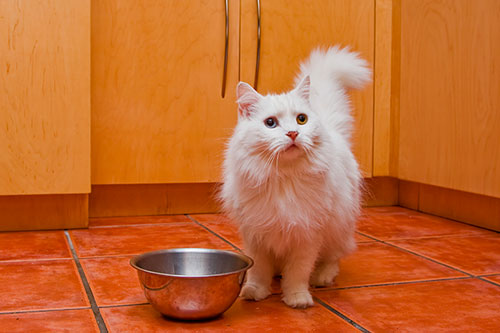
For instance, you might want to give your cat more fluids while the symptoms last. This will help to avert dehydration.
You could also induce vomiting using basic home products, such as hydrogen peroxide. A small amount of 3% hydrogen peroxide would suffice. Too much of the substance might trigger severe intestinal bleeding and inflammation.
Activated charcoal is another effective home remedy that can help you to mitigate gastrointestinal complications in a cat who has eaten spoiled food.
Activated charcoal binds to the food particles in a cat’s stomach, preventing the toxic particles from entering the animal’s bloodstream. The substance can also act on intestinal worms, especially if the spoiled food had already attracted bugs.
If the symptoms persist despite your best efforts, then take your cat for a professional checkup. Be sure to furnish the vet with useful information, including the amount of spoiled cat food your feline friend has consumed, the time of exposure, and the type as well as the food brand in question.
- INTERACTIVE TOY FOR CURIOUS CATS – Cat Amazing’s Shark Tank-famous & award-winning puzzle box is designed to stimulate and...
- ENCOURAGES NATURAL INSTINCTS – Stimulate your cat's natural foraging instincts to explore, scratch, sniff and retrieve hidden...
- STRESS AND BOREDOM BUSTER – Our puzzle cat toy is sure to pique your cat’s curiosity as it works with their favorite treats,...
Last update on 2024-07-10 / Affiliate links / Images from Amazon Product Advertising API
How Do You Keep Wet Cat Food Fresh?
The best way to keep wet cat food fresh is to follow the golden rule of “4 between 40 and 140.” In other words, any food (be it cat food or human food) that has been kept between the temperatures of 40 degrees Fahrenheit (4.4 degrees Celsius) and 140 degrees Fahrenheit (60 degrees Celsius) for at least four hours must be disposed of.
But you probably shouldn’t leave cat food out for that long in the first place. In fact, disposing of spoiled cat food regularly may reflect negatively on your finances in the long term.
Fortunately, there are several ways you keep wet cat food fresher for longer.
1. Refrigeration
If you frequently serve your cat wet food, you’ll occasionally find yourself wondering, ‘does wet cat food need to be refrigerated?’
The answer is yes. Refrigeration is actually the surest method for keeping wet cat food fresher for longer.
The best way to refrigerate wet cat food is to split the contents into meal-sized portions and put the portions into separate containers before tossing the containers into your refrigerator. That way, when your cat comes meowing for food, you can simply retrieve one container, allow its contents to thaw, and then serve it to your cat.
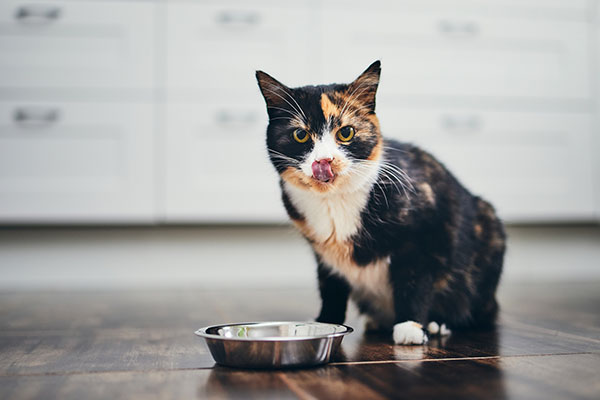
So, can I put wet cat food in the fridge?
Again, it’s not only possible to put wet cat food in the refrigerator. This is actually the most effective way to prevent the food from going bad.
Now that we’re discussing refrigeration of wet cat food, it’s also natural to find yourself wondering, how long can wet cat food stay out of the fridge?
As soon as you remove wet cat food out of the refrigerator, the food will begin to thaw. Once the food warms up to the ambient temperature, it immediately becomes subject to the “4 between 40 and 140” rule.
2. Proper storage of canned foods
Most canned foods typically come wet. These foods can last for years and may only start to go bad on or around their sell-by date.
There’s no use putting canned foods in the refrigerator, provided that you’re yet to open the cans. However, avoid storing canned foods in hotter conditions either. Extensive exposure to heat (around 100 degrees Fahrenheit) could destroy some of the nutritional elements in the food, in addition to making it unsafe for consumption.
What about opened canned foods?
Canned foods can go bad within a couple of hours once opened. In this case, your best bet would be to refrigerate the contents.
- LIVECLEAR is the first and only cat food with the power to reduce cat allergens simply and safely by neutralizing Fel D 1, a...
- Discovered through over a decade of research, Pro Plan LIVECLEAR cat food significantly reduces the major allergen in cat hair and...
- Salmon is the first ingredient in this high protein dry cat food for skin and coat care
Last update on 2024-07-10 / Affiliate links / Images from Amazon Product Advertising API
How to Leave Wet Cat Food Out
You may not always have the means or time to store wet cat food properly. Therefore, your only option would be to leave the food out.
Although experts discourage leaving wet cat food out for long, there are various tips you can implement to prevent the situation from becoming too dire.
First off, be sure to serve your cat wet food in small quantities. That will ensure that there’s only a little to discard even if the animal doesn’t finish his meal.
It’s also recommended to keep your cat’s food bowl and the general feeding area clean and well-sanitized. This may help to slow down the rate of food decomposition in the event the cat doesn’t finish his meal.
How Long Can Dry Cat Food Stay Out?
This post has largely focused on wet cat food. But if you prefer to feed your cat dry food, you could be wondering how long it takes for kibble to go bad if left out.
While dry cat food may harbor some bacteria, the condition of the food makes it hard for the pathogens to multiply.
Also, the fact that dry cat food is heavily processed means the food is less likely to have harmful bacteria. Provided that you keep the food in a moisture-free environment, it should last till its expiration date.
However, note that dry cat food shouldn’t be put in a refrigerator. Instead, you should store it in the original bags while regularly keeping tabs on the maturation date.
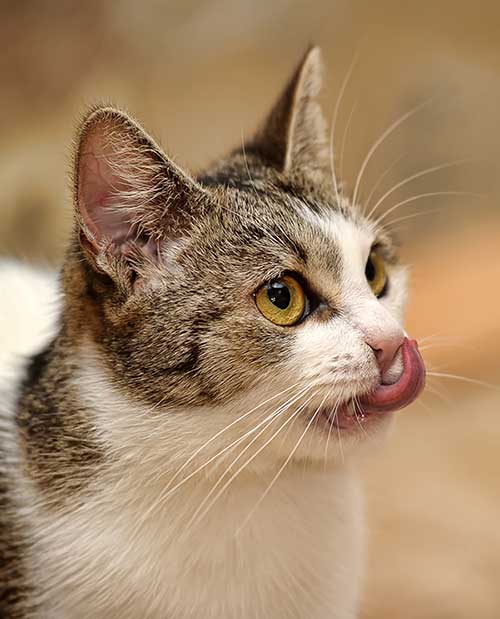
How Long Can The Wet Pet Food Be Kept Outside At Room Temperatures?
Wet cat food will stay outside at room temperature for 1 – 4 hours, after which it will start to rot. Factors like high humidity and warmer temperatures may accelerate the decomposition of wet cat food.
Fortunately, there are various ways to keep wet cat food fresher for longer so that your feline friend can safely consume it over a much longer period.
Checkout Our Favorite Cat Products
1. Best Online Course For Cat Parents
Our favorite: The Cat Language Bible (How to Finally Understand And Speak to Your Cat) – A new form of cat to human communication that many cat owners have dreamed about… but few have actually thought possible.
2. Best Immune Support For Cats
Our favorite: Tomlyn Immune Support – Best Supplement for Cats and Kittens.
3. Best Cat Treats
Our favorites: LIFE ESSENTIALS All Natural Freeze Dried Chicken And Sheba Meaty Tender Sticks – Both are Great.

